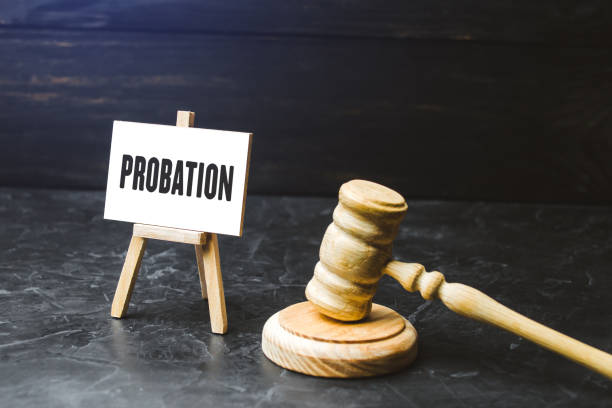The role of a probation officer is often shrouded in misconceptions and myths. These individuals play a pivotal part in the criminal justice system, balancing the dual responsibilities of ensuring compliance with legal conditions and supporting rehabilitation efforts. However, their powers are not limitless. The question “What Can A Probation Officer Not Do?” opens the door to a nuanced discussion about the boundaries of their authority and the legal safeguards in place to protect the rights of those under supervision.
Drawing from a deep well of legal expertise and an intimate understanding of the justice system, this article sets out to clarify the extent—and limits—of a probation officer’s reach. We will navigate the complex web of regulations that delineate their duties, and demystify the legal framework that defines their conduct.
Our exploration is not just an academic exercise; it is an invaluable resource for probationers, legal professionals, and anyone interested in the checks and balances that underpin our justice system. The value of this content lies in its ability to empower readers with precise knowledge about what should be expected from these officers and when their actions may overstep the mark.
As you delve into the following sections, your curiosity will be piqued by real-world examples, expert commentary, and insights into the often opaque world of probationary oversight. Whether you or someone you know is under probation, or if you simply have an interest in the workings of the criminal justice system, this article promises to provide clarity and foster a deeper understanding of the probation officer’s role. So, let’s embark on this enlightening journey to uncover the limitations that govern the guardians of probation.
Contents
What Can A Probation Officer NOT Do?
Probation officers’ powers depend on the laws and regulations in their jurisdiction. Some actions universally prohibited include:
- Developing Personal Relationships: Probation officers cannot become friends or get romantically involved with probationers. This constitutes a conflict of interest.
- Private Meetings: All meetings must occur in formal probation settings. No unofficial meetups like having coffee.
- Sexual Contact: Any sexual comments, gestures, or physical contact are strictly forbidden. This constitutes sexual harassment and abuse of power.
- Making Arrests: In most states, probation officers lack arrest powers. They must involve police to detain probationers.
- Carrying Firearms: Many jurisdictions prohibit probation officers from carrying guns. Safety concerns are referred to police.
- Lifting Warrants: Only a judge can lift an outstanding warrant. Probation officers cannot rescind warrants on their own accord.
- Planting Evidence: Officers cannot plant drugs or other illegal items. This constitutes entrapment and tampering with evidence.
- Terminating Probation: Only courts can end probation terms early. Officers cannot shorten time sentenced.
- Altering Court Orders: Probation officers must adhere to all conditions imposed by the courts. They cannot change or remove court-ordered terms.
- Obstructing Justice: Officers cannot interfere with probationers’ legal rights or judicial processes. This includes discouraging obtaining counsel.
- Providing Legal Advice: Probation officers are not lawyers. They cannot offer legal opinions or advice.
- Accepting Bribes: Officers cannot accept money, gifts, or other compensation from probationers. This constitutes bribery.
- Determining Outcomes: Officers do not decide penalties for violations. Courts make final judgements on consequences.
While extensive, probation powers are not unlimited. Checks and balances exist to prevent overreach.
What Powers DO Probation Officers Have?
Despite restrictions, probation officers still have significant authority:
- Restricting Movement: Probation terms often include geographic restrictions. Officers ensure probationers do not leave designated areas.
- Home/Work Visits: Officers can show up at probationers’ homes, workplaces, or other known hangouts unannounced.
- Searches: Officers have power to search probationers’ homes, vehicles, phones, computers, etc. with reasonable suspicion of violations.
- Issuing Warrants: If violations occur, officers request warrants for the probationer’s arrest.
- Restricting Associates: Probationers’ friends and contacts are subject to officer approval. Officers can mandate no contact with certain people.
- Mandated Programs: Treatment, counseling, community service, and other rehabilitative programs can be imposed.
- Drug Testing: Random drug testing is routine. Refusal or failed tests can prompt sanctions.
- Digital Monitoring: Phone/computer use can be monitored and restricted for sex offenders and others.
Within court-ordered limits, probation officers have significant influence over probationers’ lives. Clear communication of expectations and restrictions is essential.
Search and Seizure Powers on Probation

One key power probation officers wield is performing warrantless searches on probationers and their property. However, searches are only legal if officers have “reasonable suspicion” you violated probation.
What Constitutes Reasonable Suspicion?
Reasonable suspicion means articulable facts suggest a violation occurred. For example:
- Failing a drug test
- Not attending required meetings
- New criminal charges filed
- Reports of continued drug/alcohol use
- Absconding from supervision
Mere hunches are insufficient. Officers need demonstrable evidence. Unsupported suspicions don’t justify searches.
Are There Any Limits?
Some limits on searches exist:
- Shared Spaces: Officers cannot search housemates’ rooms or belongings without separate probable cause.
- Outside Help: The “stalking horse” doctrine prevents officers from using police to circumvent warrant requirements.
Overall, probationers have reduced 4th Amendment protections. However, defenses exist if officers exceed their authority. Consult a lawyer if you feel searches were illegal.
Key Rights Afforded to Probationers
While on probation, certain rights remain intact:
Right to Remain Silent and Right to Counsel
During probation violation hearings, you maintain the right to remain silent and have an attorney present. Statements made at hearings can be self-incriminating.
Motion to Suppress Evidence
If you believe probation officers obtained evidence illegally, you can motion to suppress it from violation proceedings. However, thresholds for claims are high.
Don’t forfeit all rights when starting probation. Seek guidance on protections available.
What Conduct is Off Limits for Probation Officers?
Probation officers must adhere to ethical and professional standards. Prohibited conduct includes:
- Accepting Gifts/Favors: Officers cannot accept any gifts or favors from probationers or their families. This could compromise objectivity.
- Discrimination: Officers cannot discriminate based on protected characteristics like race, religion, etc. Fair treatment is mandatory.
- Threats/Intimidation: Any threats, harassment, or intimidation meant to scare probationers into compliance are forbidden.
Report any concerning officer behaviors through official complaint procedures. Most jurisdictions take misconduct seriously.
What Information Are Probationers Entitled To?
Open communication is key. Probationers should be informed of:
Access to Your Case File
You have a right to review documents in your probation case file. This includes probation reports, violation allegations, and drug test results.
Complaint/Appeal Procedures
Each department must have official policies for submitting complaints about officers and appealing violations/sanctions.
Insist on transparency. Don’t tolerate secrecy or stonewalling requests for information.
Procedural Details on Arrests and Violations

Violating probation terms can lead to serious consequences. Here’s how the process works:
Probation Warrants
If an officer believes you violated probation, they petition the court for an arrest warrant. Judges determine if enough evidence exists to issue a warrant.
Police arrest you once the warrant is approved. You await your violation hearing in detention.
Violation Hearings
Hearings begin with the probation officer presenting evidence of violations. You can contest allegations and present counter-evidence.
Judges then decide if a violation occurred. If so, they impose sanctions like increased supervision, fines, jail time, or even prison.
Documenting extenuating circumstances can mitigate consequences. Retaining legal counsel is advised.
What Happens If You Violate Probation?
Myriad sanctions exist for probation violators:
- Increased Supervision: More frequent meetings, extra probation conditions, home confinement, or electronic monitoring.
- Community Service: Mandatory unpaid work, like trash pickup or graffiti removal. Hours vary based on severity of violation.
- Fines: Monetary penalties may be levied. Fines scale with seriousness of violation and probationers’ ability to pay.
- Jail Time: Short jail sentences of several days or weeks serve as a stern warning. Time on probation may restart upon release.
- Prison: Chronic violators often face revoked probation and unfinished prison terms. Months or years in confinement await.
Don’t take chances. Follow all terms to avoid harsh consequences.
Legal Assistance for Probationers
Various groups advocate for probationers’ rights. Consider contacting:
- Public defender associations – Provide free/low-cost counsel for violation hearings.
- Legal aid clinics – Offer pro bono assistance with probation matters.
- Advocacy nonprofits – Specialize in probation and parolee rights education.
Don’t remain silent. Seek help responding to alleged violations.
Communication is Key
Ultimately, clear communication between probationers and officers facilitates compliance. Insist officers explain:
- All probation rules, restrictions, and reporting requirements.
- Their precise powers and limitations.
- Reasons for added conditions or sanctions.
- The warrants and violation process.
Review probationer handbooks so you know what to expect. Ask questions. Don’t leave hearings confused.
With transparency regarding expectations and boundaries, probation can proceed more smoothly for all involved.

Trayce served as a grassroots leader and activist in Texas as President of Dallas and Texas Eagle Forum.
Trayce is Mom Caucus Member, Texas Conservative Mamas, Texas Conservative Grassroots Coalition Leader, and Grassroots America Champion of Freedom Honoree.
She currently serves as the Eagle Forum National Issues Chair on Human Trafficking.
Trayce received a Bachelor’s Degree in Marketing from Texas A&M
Currently, she homeschools her youngest child age 13 and graduated her six oldest children, ages 31 to 19.







